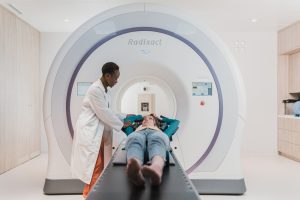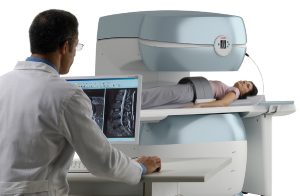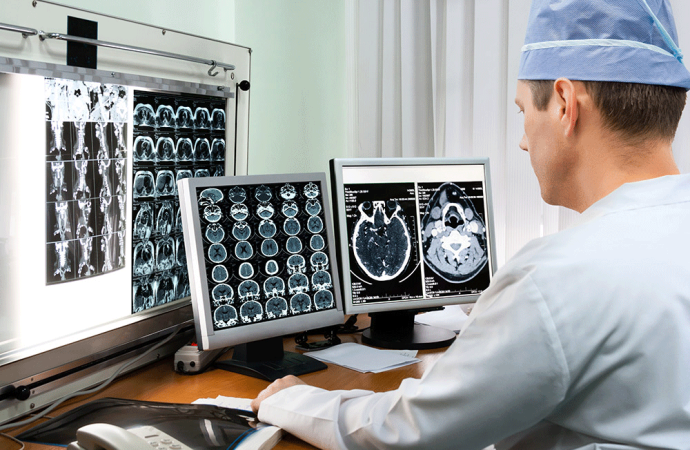Elevating Care Through AI in Healthcare The integration of Artificial Intelligence (AI) into the healthcare sector has marked a pivotal shift in how patient care is approached, offering transformative outcomes and operational efficiencies that were once beyond reach. My exploration into this technological evolution reveals how AI is not just an adjunct but a fundamental
Elevating Care Through AI in Healthcare

Image by : Yandex
The integration of Artificial Intelligence (AI) into the healthcare sector has marked a pivotal shift in how patient care is approached, offering transformative outcomes and operational efficiencies that were once beyond reach. My exploration into this technological evolution reveals how AI is not just an adjunct but a fundamental component in redefining healthcare delivery and patient management.
Introduction to AI in Healthcare
AI in Healthcare has emerged as a catalyst for change, transforming patient outcomes through the application of predictive analytics. This technology has the power to analyze vast datasets, identifying patterns and predicting outcomes that can preemptively influence patient care strategies. Such predictive capabilities ensure that interventions are timely, potentially averting adverse events before they occur.
Moreover, the innovative applications of AI extend beyond patient care into the realm of operational efficiencies. Healthcare facilities are inundated with administrative tasks that, while crucial, consume a significant amount of resources that could otherwise be directed towards patient care. AI streamlines these processes, automating routine tasks, and freeing up healthcare professionals to focus on what they do best—caring for patients. This elevation in operational efficiency is not just a matter of resource allocation but a transformative shift towards a more patient-centric approach in healthcare.
Revolutionizing Patient Diagnostics with AI

Image by : Yandex
The impact of AI on patient diagnostics cannot be overstated. With unprecedented accuracy, AI algorithms can detect nuances in diagnostic data that might escape the human eye. This level of precision in diagnostics is pivotal, as it directly influences the subsequent treatment plan and its effectiveness. By elevating the accuracy of diagnostics, AI in Healthcare ensures that patient care is not just reactive but proactive, tailored to the specific needs of the individual.
This innovative application of AI extends beyond mere diagnostics. It encompasses a holistic approach to patient care, where every decision, every treatment plan, and every outcome is informed by data-driven insights. Such an approach not only enhances the efficacy of patient care but also ensures that it is delivered in a timely, efficient manner.
Enhancing Treatment Personalization and Precision
AI in Healthcare plays a crucial role in optimizing treatment personalization, thereby enhancing patient care outcomes. By leveraging data analytics, AI enables healthcare providers to tailor treatment plans to the individual characteristics of each patient. This level of personalization ensures that treatments are not only more effective but also minimize potential side effects, improving the overall patient experience.
Furthermore, the precision in diagnosis afforded by AI elevates treatment efficacy. Accurate diagnoses lead to targeted treatments, reducing the trial-and-error approach that can often prolong the patient’s suffering. This precision not only improves patient outcomes but also contributes to the efficiency of healthcare delivery, ensuring that resources are utilized where they are most effective.
AI in Medical Imaging: A New Frontier

Image by : Yandex
The integration of AI in medical imaging has transformed diagnostic accuracy, marking a new frontier in patient care efficiency. AI algorithms are capable of analyzing imaging data with a level of detail and speed unattainable by human practitioners. This not only accelerates the diagnostic process but also enhances its accuracy, ensuring that treatment can commence without delay.
The efficiency brought about by AI in medical imaging extends beyond the speed and accuracy of diagnostics. It represents a paradigm shift in how patient care is delivered, making it more responsive and tailored to the needs of the patient. This integration of AI technologies signifies a move towards a more dynamic, data-driven approach in healthcare.
Empowering Remote Patient Monitoring
Remote patient monitoring has been revolutionized by the integration of AI, transforming data into actionable insights for caregivers. This technology enables the continuous monitoring of patients outside of traditional healthcare settings, providing real-time data on patient health that can be crucial for timely interventions. The ability to monitor patients remotely not only enhances patient outcomes but also contributes to the efficiency of healthcare delivery, reducing the need for hospital readmissions and allowing for more proactive management of chronic conditions.
AI-driven remote monitoring solutions represent a significant advancement in patient care, offering a level of convenience and efficiency that was previously unattainable. By empowering caregivers with real-time data, AI ensures that patient care is continuous, comprehensive, and responsive to the evolving needs of the patient.
AI’s Role in Predictive Healthcare Analytics
The role of AI in enhancing predictive analytics for improved patient outcomes is undeniable. By analyzing vast datasets, AI provides clinicians with actionable insights that can inform decision-making and patient care strategies. This predictive capability is crucial for preemptive interventions, allowing healthcare providers to address potential health issues before they escalate.
Moreover, the transformation of data into actionable insights by Artificial intelligence in video games changer for clinicians. It enables a more informed, data-driven approach to patient care, ensuring that decisions are based on comprehensive analyses rather than intuition alone. This shift towards evidence-based medicine is pivotal in enhancing patient outcomes and operational efficiencies in healthcare.
Challenges and Ethical Considerations in AI Healthcare

Image by : Yandex
While the integration of AI in healthcare offers numerous benefits, it also presents challenges and ethical considerations that must be addressed. Balancing innovation with patient privacy concerns is paramount, as the use of AI involves the analysis of sensitive patient data. Ensuring the security and confidentiality of this data is crucial in maintaining patient trust and compliance with regulatory standards.
Furthermore, ensuring equitable AI access across diverse populations is a significant challenge. It is essential that AI healthcare solutions are designed and implemented in a manner that does not exacerbate existing health disparities but rather contributes to their alleviation. Achieving this balance requires a concerted effort from all stakeholders in the healthcare ecosystem.
The Future of Healthcare with AI Integration
The future of healthcare with AI integration is promising, offering enhanced diagnostic accuracy and improved patient outcomes. As AI technologies continue to evolve, so too will their applications in healthcare, promising even greater efficiencies and innovations in patient care.
The integration of innovative AI solutions in healthcare is not just a matter of technological advancement but a transformative shift towards a more efficient, effective, and patient-centered approach to healthcare delivery. As we move forward, the continued evolution of AI in healthcare holds the potential to elevate care to unprecedented levels, promising a future where healthcare is more accessible, accurate, and tailored to the needs of each patient.
















